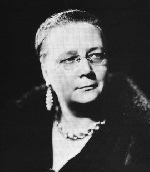Dorothy L. Sayers
writer
17 December 1957
 Dorothy Leigh Sayers was an English writer and scholar, born at Oxford in 1893, the
only child of an Anglican clergyman. She studied medieval literature at Oxford
(Somerville College), being one of the first women to graduate (1915) from that
university. Her first published writings were two volumes of verse published in 1916
and 1919. She worked for several years writing advertising copy, until she was able to
support herself by the sale of her books and stories, becoming a well-known writer of
fiction, plays and essays. She died in 1957.
Dorothy Leigh Sayers was an English writer and scholar, born at Oxford in 1893, the
only child of an Anglican clergyman. She studied medieval literature at Oxford
(Somerville College), being one of the first women to graduate (1915) from that
university. Her first published writings were two volumes of verse published in 1916
and 1919. She worked for several years writing advertising copy, until she was able to
support herself by the sale of her books and stories, becoming a well-known writer of
fiction, plays and essays. She died in 1957.
Miss Sayers' first commercially successful writings were detective fiction, and she eventually rose to the very top of that field. She wrote mostly about Lord Peter Wimsey, a wealthy gentleman and scholar, lover of rare books and fine wines, who solved detective cases because he enjoyed it, and was good at it, and because it was a job worth doing.
In case anyone is wondering what a writer of detective fiction is doing on a list of memorable Christian writers, consider that a detective story can present the thoughtful reader with many observations and questions about the nature of good and evil, about difficult moral choices, and about ways of dealing with others. Detective stories, like books of any other kind, vary in quality. When you open a novel by Sayers, and find that the first words are
Thou blind man's mark, thou fool's self-chosen snare,
Fond fancy's scum, and dregs of scattered thought,
Band of all evils, cradle of causeless care,
Thou web of will, whose end is never wrought,
Desire, desire! I have too dearly bought,
With price of mangled mind, thy worthless ware.
you know that you are not reading a run-of-the-mill whodunit.
Plays
While her detective fiction is well known to her many readers, it is her plays and works of non-fiction which most clearly show her thoughtful and erudite approach to Christianity. A few plays are noted below:
1937 The Zeal of Thy House Canterbury Cathedral commissioned a play each year to be performed at the cathedral. (T.S.Eliot's Murder in The Cathedral, a play about the martyrdom of Thomas a Becket, had been a play in this series.) Miss Sayers wrote two plays for Canterbury. The Zeal of Thy House deals with the architect who rebuilt the central portion (the choir) of Canterbury Cathedral after the fire of 1176. The play deals with pride of workmanship, pride of possession, the creative imagination, the nature of the creative act, the doctrine of the Incarnation, and the doctrine of the Trinity.
1939 The Devil to Pay is Miss Sayers' second Canterbury play. It retells the story of Doctor Faustus, who sold his soul to the devil, and how God dealt with him at the last. The moral is: evil cannot be undone, but only purged and redeemed.
1940 He That Should Come This is a Nativity play, originally for radio production, although it has been adapted for the stage. While most Nativity plays take what may be called a devotional approach, Sayers gives us the story of the birth of Jesus in (except for a prologue and and epilogue) a straightforwardly naturalistic setting, in the bustle of a crowded inn, where most of those present have no idea that anything particularly significant is going on.
1942 The Man Born to Be King After the success of He That Should Come, the BBC invited Miss Sayers to write a series of twelve radio plays on the life of Jesus. She did so, and roused some protests from those who thought it irreverent to make Biblical characters speak ordinary (as opposed to King James) English, and in general behave like real people. She replies that her point is precisely that the Incarnation really happened -- that God took human nature upon him, and lived as a real man surrounded by real people who spoke the ordinary language of their day. Each of the twelve plays is preceded by Sayers' comments, often dealing with the historical background of the incidents, and the theological issues raised by them.
1946 The Just Vengeance This play was commissioned for the 750th anniversary of Lichfield Cathedral. It is a play about the Atonement, not in the sense of being a Passion Play, but in that it discusses the theology of the Atonement, borrowing heavily from the ideas of Dante.
1951 The Emperor Constantine This pageant was commissioned to celebrate the 2000th anniversary of the city of Colchester, the presumed birthplace of Helena, the mother of the Emperor Constantine. It covers Constantine's rise to power, his conversion to Christianity, the Council of Nicea, Constantine's family troubles, and the end of his life. It deals in dramatic form with the theological issues of Nicea (whether Jesus was truly God or just a very important agent of God). As a play, with battle scenes, and council scenes, it can, if desired, be performed with "a cast of thousands", and presumably enabled anyone in Colchester who wanted to be in the pageant an opportunity to carry a spear. All in all, it is good history, and good theology, and a thoughtful discussion of the dilemmas facing a Christian in a position of power.
Acknowledgements:
Text adapted from James Kiefer's Christian
Biographies